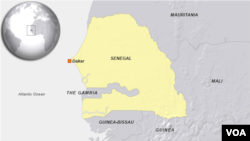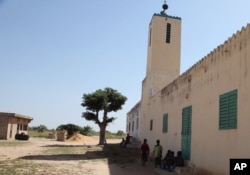Over the past month, many people in Senegal have been following the trial of 31 people accused of trying to set up a local jihadist network loyal to the Islamic State militant group. The verdicts in the case are expected as soon as early June.
A Facebook post on July 7, 2015 caught the eye of the Senegalese authorities.The post paid tribute to Senegalese jihadists who died in battle after joining ranks with Islamic State in Libya.
It was traced to Matar Diokhané, a man already known to authorities, who say he attacked a mosque in the town of Diourbel in 2012.
An investigation was opened. Over the next two years, Senegal's intelligence services uncovered a ring of nationals who they believe were trying to set up a local Islamic State network.
Thirty one suspects are now on trial, on charges that include criminal conspiracy, terrorist acts and money laundering, as well as advocating terrorist activity.
Abdou Cissé, a reporter for the popular local news outlet Dakaractu, says Senegal has already tried people over terrorism, but this is the first time so many people all at once are suspected of links to a single terrorist operation.
News from the trial often lands on the front page of local papers. Much of the coverage is focused on the controversial imam Alioune Ndao.
Ndao and Diokhané are accused of recruiting young boys and sending them to train with jihadist groups in Nigeria, Mali and Libya.
Investigators say the 11 of the 31 suspects spent months with Boko Haram in Nigeria before returning to Senegal to set up local terrorist cells in the south and east of the country.
Maitre Mounir Ballal, one of Ndao's attorneys., maintains his client's innocence. He says Ndao never set foot in Nigeria and was only "implicated in this case because Matar Diokhané approached him to gather his views on the interpretation of Qur'anic verses."
The state prosecutor has requested forced labor in perpetuity for Diokhané and 30 years for Ndao. He has also asked for eight of the 31 suspects to be acquitted. Those remaining would face possible penalties ranging from five years in prison to hard labor for life, if convicted.
Security experts like Pierre Lapaque have watched the proceedings closely. He is the regional representative for the United Nations' Office on Drugs and Organized Crime. He says the trial shows that the investigation has been thorough and that the risk of terrorism in Senegal is being taken seriously.
Concerns over criminal code
But rights groups have expressed concern. In 2016, the authorities amended Senegal's criminal code and widened the scope of offenses considered terrorism-related.
"We have concerns about the conditions of their arrest and the conditions of their detention," said François Patuel, the West Africa Researcher for Amnesty International. "So for instance, Imam Ndao was arrested in 2015. He's been held in pre-trial detention for about two years and a half. That's a very long period of time."
Last year, a court in northeast Nigeria began a mass trial of 1,600 Boko Haram suspects. The trial was initially held behind closed doors. As a result of those proceedings, there have been at least 205 convictions and another 526 suspects released so far, mostly for lack of evidence.
When asked about the ongoing case in Dakar, local human rights lawyer Senghane Senghor points to the Nigeria example.
He says at least in Senegal, the trial is taking place in public. Everything is being debated publicly, and there are people allowed into the courtroom every day.
Senegal has so far been free of terror attacks.
But experts say the country is at risk. It bears strong ties to France and shares a border with Mali, which continues to grapple with an ever-evolving myriad of violent extremist groups.









